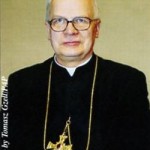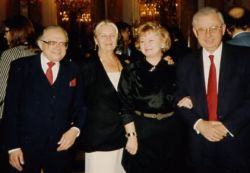20 kwiecień 2008
Work ethos
Polish independence came too late for a majority of emigrants. Those people who had been tested in battle saw their purpose in raising the torch of freedom and remembered their country as it was before the war. Today’s Poland is foreign and incomprehensible, which is understandable. They were also unable to divest themselves of mistrust towards those who grew up in the PRL and – it was believed – who had to swallow the accompanying ideology.
KATHERINE BUDD
from London
After the Second World War two centers of Polish political emigration developed: in Paris – focused around the monthly publication “Culture” and in London, whose existence was based on the former government of the Republic of Poland in exile. Both of these emigrant groups could be traced back to the same tradition – an independent Poland during the interwar period. They also emerged from the same wartime experiences – the 2nd Polish Corps lead by General
Władysław Anders.
Before the outbreak of World War II only a few thousand Poles lived in Great Britain. The first wave of Polish refugees arrived to the British Isles after the defeat of France in 1940. The seat of Polish power was also relocated to Britain. Despite the war, Poles began to organize their lives in a new country. The first publications were established (“The Polish Daily,” established in July 1940 and issued to the present day, is the only Polish newspaper published daily in Western Europe – a real phenomenon on a world scale) along with theaters, clubs and cinemas. The army was stationed first and foremost in Scotland – until today Polish soldiers recall the ladies “of a certain age” with a glint in their eyes who supposedly did more for Polish-Scottish relations than London politicians on their boat.
Soon after the war there were close to 200,000 Polish soldiers and civilians in Great Britain, mainly those who arrived by way of the Soviet Republic as well as others freed from prisoners of war and concentration camps on the territory of Germany. Refusal to return to Poland was a decision with a political comment on one’s position towards the post-war reality. One of the deciding elements was that a significant majority of this group had nowhere to return – their homes remained behind the demarcation line drawn by Curzon during the Polish-Bolshevist War, a line that was suddenly promoted to the rank of state border.
The basic factor which shaped emigration activities during the entire post-war period and ensured that these activities were met with silence in communist Poland was the existence of a ruling elite outside of Poland, the continuation of governments before September 1, 1939. The legal emigration, which based their authority and position on the existence of powers secured in the constitution, tried to represent the Polish question in the West for an entire decade to prevent its classification as an internal problem of the Soviet Bloc. Paradoxically, emigration communities who were not clothed in the legitimacy of legality had a larger, more concrete influence on the development of events in Poland than the most organized London circles.
In London the construction of “Poland outside of Poland” began. Many Poles from that generation lived in isolation of British realities for a long time. This was also a result of the ambiguous attitude British people had towards Poles. On the one hand, Winston Churchill said: “Her Majesty’s government will never forget the debt they owe to the Polish troops who have served them so valiantly and for all those who have fought under our command…,” and on the other Poles were encouraged to return to their own country, since for the average Smith, Poles suddenly became competitors in the workplace and the newly established healthcare system. This situation changed with the passing of time. In the 1960s Poles earned a reputation as good workers, solid citizens and people who valued family life.
Politically, London emigration was fairly homogeneous in fundamental matters. Despite constant discord and party quarrels, the conviction that Poland’s situation could only be changed through a fundamental change in the international system prevailed. Any cooperation with Poles arriving from the fatherland was rejected, even in the case of scientists and writers. In justifying this position General Anders warned that this did not indicate a pulling away from Poland and wrote: “We must beware of, however, the contacts offered to us with people who arrive that clearly support the regime and play a false role in an attempt to weaken us politically.”* This position was expanded to embrace contact with the opposition that developed in the 1970s, and more so because it did not call upon the independence slogans and terminology of the Second Polish Republic. It also meant that events in Poland – in 1970, 1976 and finally in 1980 – were met with unbelief and a healthy dose of skepticism. This didn’t hinder in the organization of tailored protests on an enormous scale, first and foremost help for victims of the regime as well as concrete, including financial support, among others, for the Workers’ Defense Committee.
The introduction of Marshal Law on December 13, 1981 and the stay of three thousand Poles in Great Britain put forth the necessity of coexistence with the new arrivals for “old” emigration, arrivals that began to create their own, new organizations. This was not an easy coexistence. The new immigrants treated communist Poland as the fatherland. Their political horizon didn’t reach prewar Poland, but called upon the terminology of “Solidarity” which – although treated with kindness – was quite foreign for emigrants from the old generation. The new emigration didn’t raise the question of independence, postulate the return of eastern territory taken by the USSR, or say that its goal was a departure from communism’s economic planning and the return of capitalism.
The crucial events of 1989-90 were observed in London with mixed feelings. Negotiations with communist rulers were considered a necessity but when they were underway, London hesitated to offer its unconditional support. London was divided into supporters and opponents of the agreement concluded at the Round Table in Warsaw. The latter were decidedly louder and were provided more coverage on the pages of emigration press. The majority of Polish opposition activists had either never heard of the president and government in London or knew of the government in exile but considered it to be an anachronism without significant meaning.
The star of London emigration began to shine along with presidential elections.
Lech Wałęsa, not wanting to take power from the hands of his communist predecessor, clearly made it understood that if a ceremonial handover of insignias didn’t take place on the day of his inauguration, there wouldn’t be another occasion. In one interview for the press before the election, asked about his position towards the government in exile, Wałęsa said that the moment he took up residence in Belweder he would send a special plane to bring these older gentlemen and their checkbooks to Warsaw. On the same day a plane was actually sent to London from Warsaw. Those who were onboard in light of their various functions and took part in the ceremonial transfer of state insignias at the Royal Castle in Warsaw as well as the ceremonial session of parliament to swear in the new president, believe that it was one of the greatest experiences of their lives.
Polish independence came too late for a majority of emigrants. Those people who had been tested in battle saw their purpose in raising the torch of freedom and remembered their country as it was before the war. Today’s Poland is foreign and incomprehensible, which is understandable. They were also unable (this applies to at least some emigrants) to divest themselves of mistrust towards those who grew up in the PRL and – it was believed – who had to swallow the accompanying ideology. Even though the Third Polish Republic had existed for some time, newcomers from Poland were spoken of in London salons with a certain feeling of superiority as “those from the PRL.”
Young, well-educated Brits of Polish descent adjusted much better to the new conditions. At one time as many as 6,000 of them worked in Poland. Some made their careers, among them Jacek Rostowski, who was one of Leszek Balcerowicz’s advisors and Janusz Bugajski, director of an institute dealing with the problem of Central and Eastern Europe in Washington.
In one sense the model of London emigration turned out to be successful. The years of survival and influence acquired during that time made it a considerable power still. Many organizations created in the first half of the century, such as the Association of Polish Combatants or the Polish Center, still exist. In the Polish Union, a type of umbrella organization, there are over 80 organizations registered.
It is not meaningless that the Polish Social and Cultural Community in emigration has a wide range of Polish institutions near its headquarters. There are also galleries, theaters, libraries, bookshops, coffee houses, restaurants and clubs. This is a place well-known not only to emigrants but also to those who visit the city on the Tamiza briefly.
Unfortunately, none of the “Solidarity” organizations survived. This may be because there were few authentic political activists in the 1980 emigration and the majority of them returned to Poland after the changes. However, new organizations were created while others modified their statutes in order to welcome new members. One of the most resilient is the Polish-British Business Association (PEBA) – its members, young businessmen and workers of London City meet informally as well as through charity campaigns and European lectures.
London emigration, divided over many issues, spoke with one voice about two: it supported Poland’s entry into NATO and the European Union. The Polish Union in Great Britain ran a campaign related to these issues for six years by organizing meetings with British, Polish, EU and EU-candidate-state politicians. Through the agency of the Polish-British Parliamentary Group, which includes deputies from all political factions, the Union initiated European debates in local parliaments. Over 200 answers to a letter sent by the president of Polish Union concerning the matter of Nice to British parliamentarians were received.
Sale of the former headquarters of the president of the Polish Republic, together with funds collected for the National Treasury, became the basis for establishment of the Polonia Aid Foundation Trust. From the interest of this capital various enterprises of a cultural nature are financed. Two other funds – Dzienisiewicza, created at the bequest of a testament in aid of the Association of Polish Technicians (one of the organizations that today are as resilient as years ago), and the Grabowski Foundation – provide annual stipendiums for Polish youth. The Grabowski Foundation also helps finance the School of Slavonic and East European Studies. Interest in Poland is also proven by Polish departments established in recent years in Oxford and Glasgow.
How many Poles currently live in Great Britain? During the general census of 2001, 60,000 individuals declared their place of birth to be Poland. In the 1991 census 70,000 made this declaration. To this number we should add at least twice as many people with Polish roots, who feel a connection with their Polish heritage (among others the current Minister for European Affairs, Denis McShane, belongs to this group). Every year Great Britain is visited by approximately 200,000 tourists. It is estimated that one-fourth extend their stay and that the number of visitors is around 100,000 but the Ministry of Internal Affairs avoids comment. In comparison with the United States, Germany or France, Poles are not a significant minority in Great Britain. However, they are a visible and resilient group. Jan Mokrzycki, the president of Polish Union says that this is because Poles never asked for anything, satisfying their needs within the framework of their own organizational structures. This is one of the consequences of a “government in exile” in which one of the most important values was the ethos of social work.
Katherine Budd
London
* The collection of General Władysław Anders, col. # 270/34, General Władysław Sikorski Polish Institute and Museum in London.


























CATHOLIC CHURCH
Continuation and breakthrough
A little over 90% Poles declare themselves to be Catholic. However, 5% of believers do not attend church at all. 53,9% of believers declared they were living in accordance with the commandments of the Church. więcej...